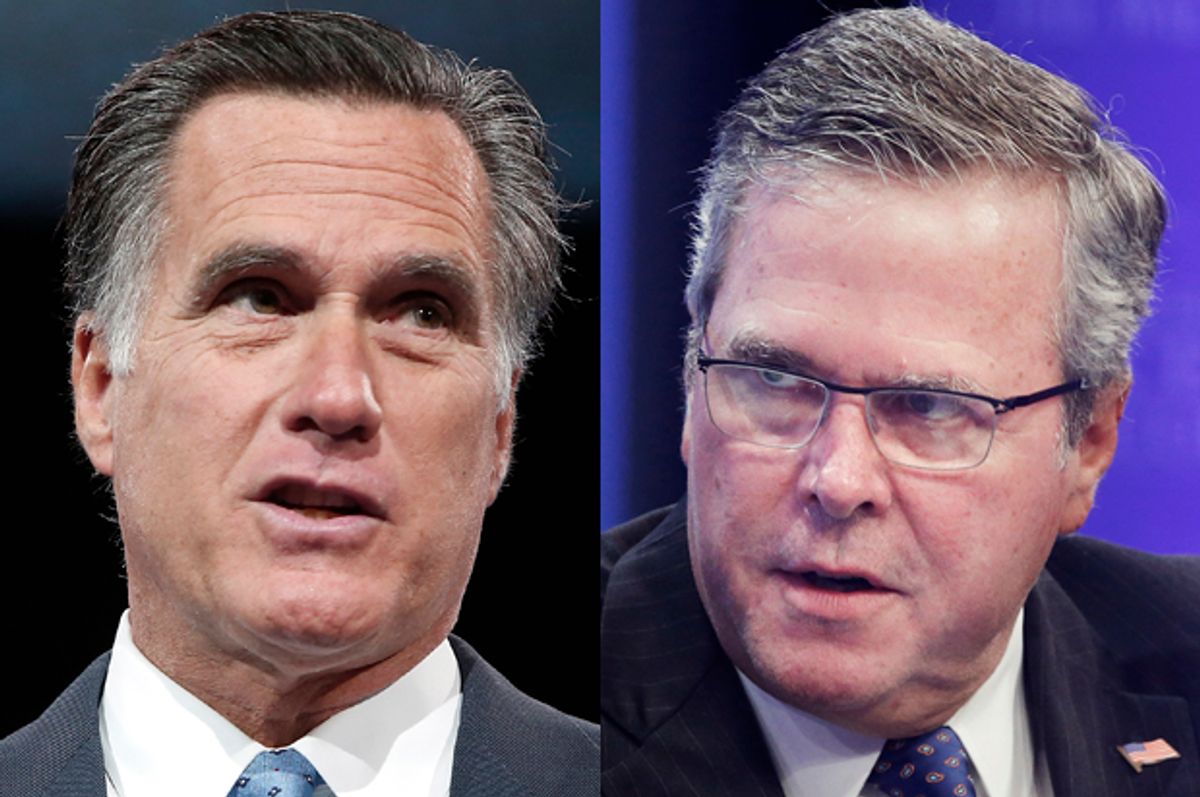You can believe the Jeb Bush campaign -- now set, at long last, to become the Official Jeb Bush Campaign today -- when it argues that it never believed winning the presidential nomination would be simple. He's maintained some policy positions that don't sit well with the Republican base, and there's considerably more viable competition this time around than there was in 2012.
But the hope was that he could have the "moderate" or "establishment" lane, traditionally the fast-track to the nomination by GOP standards, to himself, especially after Mitt Romney got out of the way in January. The ten or so conservatives could fight it out among themselves, and Bush could walk away with everyone else.
So far -- and yes, it is only June 15, 2015 -- Jeb is not walking away with anybody.
Jeb's numbers among conservatives are atrocious. They were atrocious earlier this year, as Salon's Luke Brinker wrote in February, and they're atrocious now. They're far worse than Mitt Romney's were at the corresponding time in the 2012 cycle, and Romney famously was so distrusted by the base of the party that, at various points in the cycle, Michele Bachmann, Donald Trump, Rick Perry, Herman Cain, Newt Gingrich, and Rick Santorum appeared poised to give him a run.
And unlike Romney, Bush has been unable to build up a buffer of support among "moderates" to keep him a step ahead of the rest. Romney had trouble breaking 30% in polls for a while, but he rarely fell below 20%. What it comes down to is that Jeb Bush, who was locking up support from so many establishment elements of the party a few months ago, now sits at 11% in an average of the most recent national polls. He is nowhere in Iowa, which he doesn't need to win. He still sits at or near the top in polls of New Hampshire, but still in the low-teens. He really ought to win New Hampshire.
Four years ago, Romney was able to unite the Republican establishment behind his candidacy, and Jeb has been unable to do that. (This is not an especially great credit to Romney's skills; it just so happened that he was the only not-totally-insane person running.) His inability has been noted by figures like John Kasich, the moderate Ohio governor who, after a relatively slow beginning to the year, is now poised to jump in. Kasich may not go far. More dangerous for Bush are figures like Marco Rubio and Scott Walker, who draw support -- and money -- from both the establishment and the conservative movement.
Jeb Bush is locked into a situation where he's anathema to conservatives, moderates don't seem all that fired up about George W. Bush's brother, and leading figures in the party are concerned about his "rusty" performance. What does he do?
He dumps a lot of money on everyone.
For all of the insider nonsense about how a couple of people trading jobs in Jeb's campaign spelled doom for him, the more interesting story about Bush's campaign regarded his fundraising. By "his fundraising" we mean the fundraising of his super PAC, which can raise unlimited funds and will assume many of the duties of a traditional campaign organization for Bush this cycle. (There's another reason why the story about the "shake-up" in his campaign was so overrated: all his official campaign is going to do is buy plane tickets and gas to shuttle the candidate around, so who cares who's playing strategist and who's playing manager? One's going to look for plane fares on Travelocity while the other tries Expedia. Big whoop.)
The Washington Post reported earlier this week that Bush's super PAC is expected to fall short of its goal of raising $100 million by the end of the month, a figure that's been thrown around for months (and even been considered conservative.) The Bush campaign pushed back hard against that, saying that oh yes we goddamn are on pace to raise that much money!
The Bush campaign is nothing without its talk of awe-inducing sums of cash raised. Even if its super PAC raised "only" $99 million, still a whole hell of a lot of money, that would be a signal to operatives and other donors that maybe the Bush campaign is stalling out after an impressive spring, and that would be the end of that. Rick Perry raised a significant amount of money in 2011 when he debuted. Once it became clear that he was a sucky candidate, though, the money stopped.
Bush's campaign relies on plodding along until later in the year, when his super PAC can dump avalanches of cash on any opponent who appears to be gaining steam, and doing this over and over until, if necessary, nominating contests in all 50 states plus territories are held. It's how Romney won in 2012, and that wasn't an easy process. Jeb Bush can only pray that his path is as easy as Mitt Romney's.



Shares